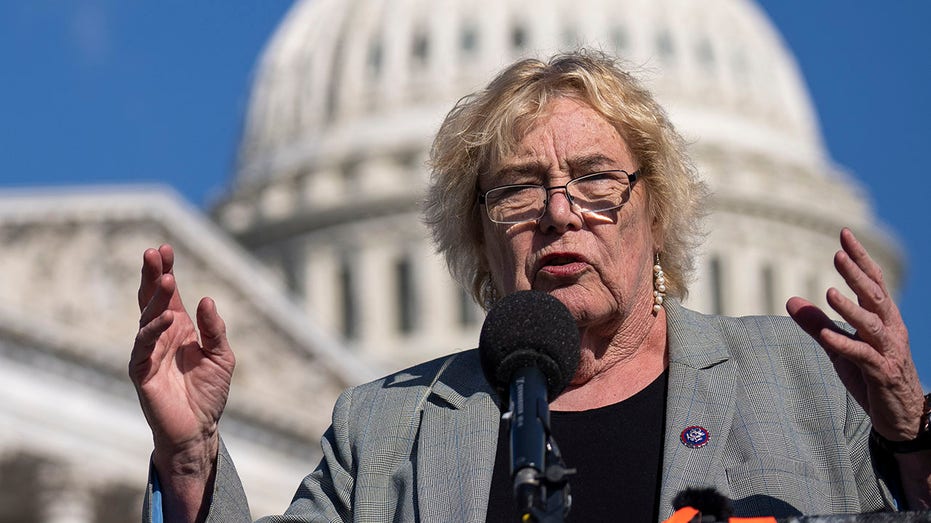House Democrats introduce bill to ban lawmakers and their families from trading stock
The Combatting Financial Conflicts of Interest in Government Act would required those banned from trading stock to divest their holdings or put them into a qualified blind trust
FOX Business Flash top headlines for September 27
Check out what's clicking on FoxBusiness.com
House Democrats introduced legislation Tuesday that would prohibit federal officials from trading stocks in an effort to curb potential conflicts of interest.
The bill, titled the Combatting Financial Conflicts of Interest in Government Act, would ban congressional lawmakers and their spouses and dependent children, federal judges, Supreme Court justices, the president, vice president, members of the Federal Reserve System’s Board of Governors and others from trading or owning investments in securities, commodities, futures, cryptocurrency or other digital assets.
Those barred from trading stocks would be required to divest their holdings or put them into a qualified blind trust.
But the legislation does allow officials to place their money in other investments, including diversified mutual funds and exchange-traded funds; US Treasury bills, bonds and notes; and state and municipal bonds.
BOND MARKET CRASH FORESHADOWS NEW LOWS FOR US STOCK MARKET, BOFA WARNS

House Democrats introduced legislation Tuesday that would prohibit federal officials from trading stock in an effort to curb potential conflicts of interest. (J. Scott Applewhite / AP Newsroom)
Officials and family members covered under the bill would have to comply with the measure within 180 days of it being enacted, or when they take office.
Violators of trading or ownership restrictions would be fined $1,000. If the violation extends beyond 30 days, they would be fined an additional $1,000 plus "an amount equal to 10% of the value of the covered investment that is the subject of violation at the beginning of the additional 30-day period of a continuing violation."
Individuals who do not file their financial reports on time would be subject to a $500 fine, up from the current $200. For each subsequent 30 days, they would have to pay an additional $500 fine plus 10 percent of the value of the transactions that should have been included in the report.
The bill would also give the attorney general the authority to bring a civil action against people subject to the legislation who "knowingly and willfully" make prohibited transactions.

The speaker's husband, Paul Pelosi, is a venture capitalist and one of the most active trading participants among congressional spouses. (Tasos Katopodis/Getty Images / Getty Images)
House Speaker Nancy Pelosi, D-Calif., initially opposed the idea of a ban before directing Committee on House Administration Chair Zoe Lofgren, D-Calif., in February to draft the legislation. The speaker's husband, Paul Pelosi, is a venture capitalist and one of the most active trading participants among congressional spouses.
A bipartisan group of House lawmakers wrote a letter to leadership earlier this month requesting a vote on a lawmaker stock trading reform bill.
Pelosi said a bill would likely come to the floor this month, but the House is only set to be in session from Wednesday evening until Friday afternoon, and government funding legislation is also on the calendar.
LARRY SUMMERS SLAMS UK TAX CUTS AS ‘UTTERLY IRRESPONSIBLE,’ WARNS OF GLOBAL CRISIS

Committee on House Administration Chair Zoe Lofgren, D-Calif., was chosen by House Speaker Nancy Pelosi, D-Calif., to draft the legislation in February. (Drew Angerer/Getty Images / Getty Images)
The bill also faces other hurdles, including voiced opposition to a trading ban from House Majority Leader Steny Hoyer, D-Md., although his office has said he will not make an official decision until he sees the final version of the legislation.
And while the trading ban was introduced by House Democrats, some notable Republicans in both chambers of Congress have supported the idea. Texas Rep. Chip Roy and Missouri Sen. Josh Hawley have both sponsored or co-sponsored bills pushing for a trading ban. House Minority Leader Kevin McCarthy said earlier this year he would consider blocking members of Congress from trading stocks if Republicans take back the House.
CLICK HERE TO READ MORE ON FOX BUSINESS
The Senate is unlikely to take action on its own ban on trading until after the midterm elections in November.





















